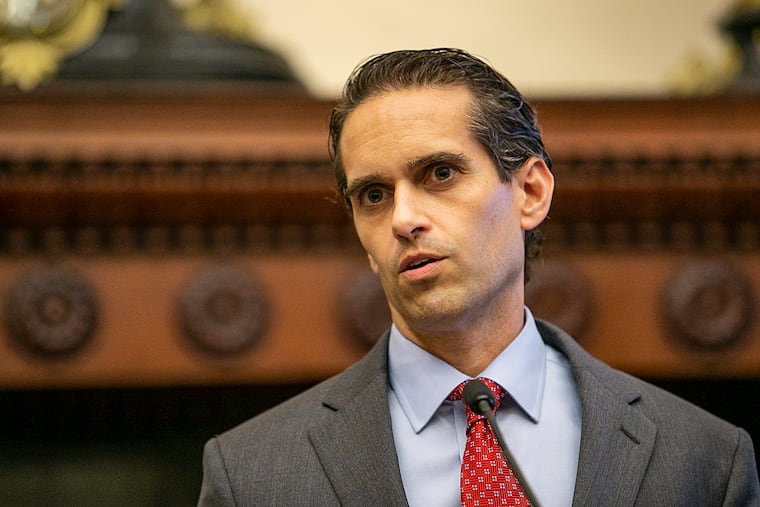Philly announces a crackdown on rampant housing theft
The city of Philadelphia has announced new steps to thwart those who steal houses from unsuspecting owners.

Philadelphia officials announced a series of safeguards Wednesday intended to crack down on the theft of houses and lots in the city.
Housing theft has become endemic in Philadelphia as gentrification has spread and property values have risen in increasingly desirable neighborhoods, a series of Inquirer articles has shown over the last year. Fraudsters forge deeds and pose as fake heirs to take ownership of properties and flip them to developers for big profits.
Mayor Jim Kenney, in rolling out the measures at City Hall, called deed fraud a “terrible crime” that all too often victimizes the city’s poorest residents, who can least afford the up to $10,000 in legal costs to attempt to win back properties they owned or inherited.
The city records commissioner, James Leonard, unveiled a system called Fraud Guard, which will automatically email people any time their names appear on a deed, mortgage, or other real estate record filed with the city. The web address to sign up for the service is phila.gov/deed-fraud.
Those who receive such alerts and suspect they are a victim of fraud may view the documents online free. Previously, people had to buy the documents through the city’s Philadox system.
For the first time, Leonard said, the city has begun creating a permanent database of all notaries who verify real estate transactions. The idea is to create a tool, viewable in Philadox, to enable prosecutors and police to spot patterns of crime, such as the repeated use of a particular notary on suspicious deals.
Property thieves often also forge the names of the same notaries on documents or rely on crooked notaries to spoof the authenticity of fake deeds — easily circumventing the only check on the legitimacy of real estate filings.
Leonard said his office has also redesigned the deed room’s website, adding more tips on how to spot fraud. And he said the office has updated its equipment to log digital photographs of those who bring in deeds for processing and to copy their driver’s licenses.
Also speaking Wednesday was Judy F. Berkman, senior counsel with the nonprofit Regional Housing Legal Services, who chairs a task force of legal experts, prosecutors, police, notaries, and title companies that is studying changes to reduce deed theft. She said its report will be released early next year.
Thieves steal properties mainly through a pair of tactics. In the simplest approach, they forge the names of sellers, and either rely on unscrupulous notaries or forge a notary’s signature and stamp. Fraudulent documents often go unnoticed by deed room staff, which processes about 200 deeds a day and is under pressure to handle them quickly.
In a more complex scheme, the thieves pose as heirs to take ownership of long-ignored properties, filing bogus family trees and paperwork that goes largely unexamined by Orphans Court and the Register of Wills’ office.
Finally, there is another group making deals and acquiring properties through methods that raise ethical issues but apparently remain legal. This group of entrepreneurs, known as “wholesalers,” prey upon sellers who are ignorant of the true value of properties, paying far less than market rate. The wholesalers then flip the land or buildings to developers for massive profits.
» READ MORE: Stealing from the dead
In all scenarios, the thieves typically look for properties that appear to have been abandoned by owners when neighborhoods were in deep decline and their holdings had almost no value.
While the city tried to tighten its oversight a decade ago after a flurry of investigative articles in the Daily News, that response has been ineffective.
The problem has gotten so severe that, as The Inquirer reported this year, apparent thieves have even stolen from each other. Some theft rings have been operating unchecked in the city for years. Reports of housing theft to the city went up 75% last year and are still at that level, officials said.
» READ MORE: In gentrifying Philly, speculators pay heirs peanuts — then flip their properties for massive gains
Officials — from police and prosecutors to regulators — have appeared overwhelmed. Victims, developers, and real estate lawyers routinely say their complaints to law enforcement go unheeded.
The Philadelphia District Attorney’s Office acknowledged earlier this year that it lacks enough prosecutors to pursue many cases in which only a single house is taken. The office has assigned only three prosecutors to the cases, which can take extensive investigation to unravel.
The new Philadelphia email alert system is not unprecedented. Montgomery County’s deed office provides a similar service, called Fraud Sleuth, though participation there is limited to property owners.
In the last round of reform, deed room staff began sending letters to owners whenever their properties were sold. Leonard said adding email messaging will more quickly alert owners or other interested parties and family members who might never have received the written letters.
He noted that victims who want to reverse theft will fare better when they act quickly — before the thief flips the real estate or crews begin renovating the property.
The longer the delay, he said, “the more damage that can occur.”
To be sure, the emails may not reach the 20% of Philadelphians who don’t have internet accounts. And Kensington activist Ed Cummings, who joined neighbors in a fight against the loss of park property there in a deed dispute, questioned Leonard about how to stop thefts before they take place.
The emails, Cummings said, would “close the barn door after the horses are stolen.”
Leonard didn’t dispute that, but said the crackdown would likely deter some thieves and make others easier to catch.